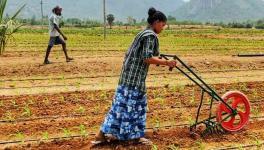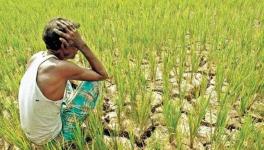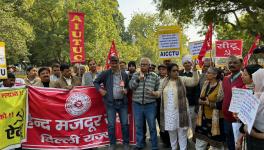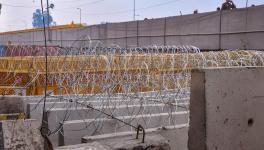Sadda Haq, Aithe Rakh: Women Farmers at Singhu Border Refuse to Back Down
Image Credit: Aritry Das
“Women also do farming. That’s why we have come to claim our rights. We don’t have land in our names, but we work with our families on the farms,” said 55-year-old Ravinder Kaur while sitting with a group of women, peeling and cutting vegetables in preparation for the evening langar at Singhu border. Farmers have been protesting here for more than two months against the Centre’s three farm laws, and women have been central to sustaining the movement, both on-site and off-site.
Kaur has travelled to Singhu from Punjab’s Sangrur with a group of around 10 women from her family and community who will stay at the protest site for a week until another group comes to replace them. She said her son and his wife are taking care of their three-acre farm while she is at the protest.
Image Credit: Aritry Das
These women come in turns to the protest site where the farmer agitation has been going on since November 26 last year. They have braved the cold, the discomfort of living in small tents and back of trucks, lack of basic facilities, which have been either denied or blocked by the security forces on government orders. Still, sometimes taking their small children with them or sometimes keeping them at home in care of some family members, they have made four to five trips to the protest in the past two and a half months.
“Sadda haq, aithe rakh (give me my rights, right here),” said Harjinder Kaur, the eldest woman in the group who is in her late 70s, and has stayed at the border for around 20 days. She, like most of the women at Singhu, say they are first-time protesters.
Gurmeet Kaur, another farmer from the women’s group from Sangrur, said she was in her 50s and has been doing ‘kisani’ (farming) from when she was a child. “Generations of our family have been engaged in farming. Now this government has brought the black laws that will destroy our livelihoods, leave our future generation food growers to die without food,” she said with a hint of rage. “These laws are evil; these should be repealed. We will take what is rightfully ours,” she said, adding that they will protest for two years if that is needed.
“We will fight till the end and we will also make the men fight against these laws,” Gurmeet said, adding that farmer families with grandparents, fathers, mothers, sons and daughters have together come to make their stand there. “Farmers never accept defeat. Our Guruji has taught us not to back down.”
Asserting that the farmers protest will dent the Bharatiya Janata Party’s (BJP) prospects in upcoming elections in different states, she said farmers’ support had given Modi his throne and the farmers will remove him from power as well. “Modi will go down, he will start selling tea again,” Gurmeet said taking a dig at Prime Minister Narendra Modi and sparking a bout of laughter among the women around her.
The women said they are not in favour of the laws being put on hold a proposed by the government. Gurpreet Kaur, a 27-year-old woman farmer and the youngest in the group, pulled apart a pod of peas and said the copies of the laws should be torn apart like that.
Another group of women from Moga sat at a tent with some young men from their families, two kids and few men from other villages, having an evening chat. The eldest person there was an 82-years-old woman who demanded, “Get me a meeting with Modi. I’ll tell him what is wrong with the laws.”
Women, Undaunted, Will Take Part in ‘Rail Roko’
“Apna haq leke jayenge, Modi ko hara ke jayenge (We will take what is ours, we will defeat Modi),” is a phrase that is echoed by most women protesters at Singhu who appear undaunted and consistently humorous even in the face of the arrest of protesters, farmer leaders and the dwindling of the crowd at Singhu. One woman from the Sangrur group says the crowd seemed thin that day (on Friday) as many people have left for home after staying a week while their replacement groups were yet to arrive. On the other side, Gurpreet said she and some of the women will go back to Punjab to take part in the ‘rail roko’ on February 18 protest at their villages.
One of the women from the Moga group, Sandeep Kaur said: “It’s been two months people are out of their homes, protesting in the cold, and their anger is rising; the PM should listen to us as soon as possible.” Sandeep said she was looking forward to participating in the Rail Roko programme, for which she will go back to Punjab. She said, “We will take part with our brothers and sisters wherever the programme is held as we have already been doing for the past two months -- at toll plazas or petrol pumps [of Reliance].”
Avtar Singh, a leader of BKU Lakhowal faction, pointed out a trend behind a somewhat thinning of the crowd at the border is the strengthening of local level protests and gatherings in the adjoining states such as Punjab, Haryana and Uttar Pradesh.
Image Credit: Aritry Das
The decentralisation is also discernible from the fact that several farmer union members from Bharatiya Kisan Union (Lakhowal) and All-India Kisan Mazdoor Sabha (AIKMS) told NewsClick that while their contingents will stay put at the border, local people mobilised by farmer organisations in respective states will take the lead in staging the ‘Rail Roko’ protests. For this, only leaders and those responsible for organisation will travel from the Delhi borders in small groups to different states assigned to them for mobilisation of protesters for the ‘Rail Roko’ programme, they said.
Harmesh Singh Tesi, member of the AIKMS, who hails from Alipur village in Hoshiarpur, said: “In Punjab, our family has been associated with AIKMS, and that is why they often came to protests. But this time, we have raised a lot of awareness about the laws since July last year [when the laws were proposed]. Now, both common men and women have joined the protest. We have created a system of weekly rotation of people from each village to the protest and people also take care of each other’s farms.”
Difficult for Women to Protest, But Farm Laws Will Hit Them Harder
Sandeep, who comes from a big farm family, believes the laws will have a domino effect as it will affect big and small farmers and then the agricultural labourers who work for them. “Most of the people in our farmer and farm labour families, especially women, are not very educated. If they lose their kheti, they will become unemployed, they would not get a proper job,” she said expressing concern.
She further said that more women should join the protests, but it becomes difficult for them to do so as they have to take care of the farm, children and other household chores when the men come to the protest.
Activist Kavitha Kuruganti, who has long worked on farmers’ rights, said that one needs to also look beyond the “visible participation of women” in the protests as they put in extra labour over and above their regular work when the men in the family go to participate in the protests.
There is also a huge issue of access to toilets for women, especially because police have raised barricades within and outside the protest, barring easy access to some of the few mobile toilets.
“We only call as many women from our villages as much we can accommodate with such less toilets,” Tesi, who had just sent back his octogenarian mother home, said.
Image Credit: Aritry Das
In India, women agricultural workers are not recognised as farmers as the definition of a farmer is tied to land ownership. According to the Periodic Labour Force Survey 2018-19 released last year by National Statistical Office (NSO) 71% of rural women workers are engaged in agriculture and allied activities. But out of these only 13% have land. Thus, women farmers do not get farm loans or any other benefit, while their work is considered invisible as workers on family land or as tenant farmers.
The latest farm laws would disproportionately affect women farmers who constitute a large portion of agricultural workers, say activists. A statement by the Mahila Kisan Adhikar Manch (MAKAAM) says even though most women farmers sell their produce to private traders outside the “male-dominated APMCs,” the existence of mandis at least ensure that prices remain closer to the Minimum Support Price (MSP) and therefore, it narrows the margins of exploitation.
The statement says: “Exploitative as the private traders may have been, they still provided the support that a woman farmer needed by way of seed, credit and purchase of her small quantities of produce and paid her upfront.” The new Act that proposed a market outside the mandi is likely to bring in new and bigger private players who may not see profit in trading with smaller farmers, which women mostly are,” MAKAAM said.
Commenting on the government claim of the laws allowing farmers to sell produce anywhere, Kuruganti said: “The patriarchal society does not allow women to have mobility. So, they accept whatever market that comes to them and that is mostly very exploitative.”
Kuruganti, who has been part of the panel that engaged in discussion with the government on the farm laws, also underlined that the ongoing farmers protest has tried to create an accessible space for women unlike past farmer movements.
Get the latest reports & analysis with people's perspective on Protests, movements & deep analytical videos, discussions of the current affairs in your Telegram app. Subscribe to NewsClick's Telegram channel & get Real-Time updates on stories, as they get published on our website.
























